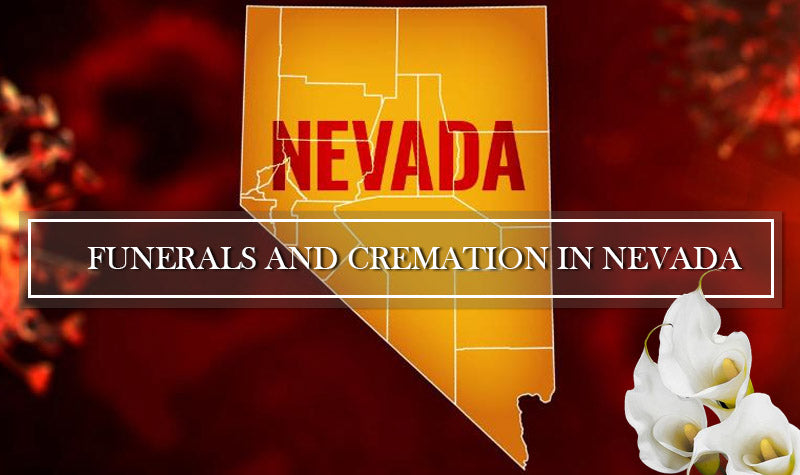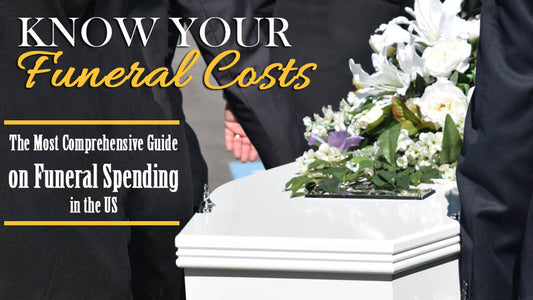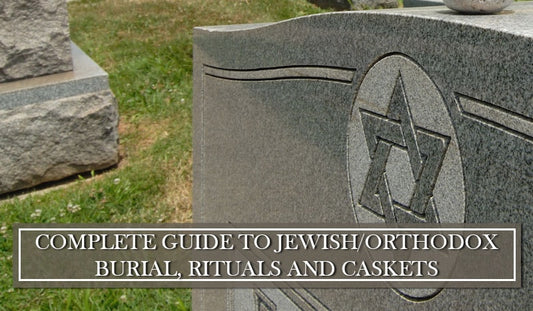
Rules and Regulations for Funerals, Burials and Cremation in Nevada
Truth be told, we are never really ready for the death of someone we care for. Along with the pain we have to deal with, there is also the preparation and planning we need to address. Going over the rules, financial aspects, and related topics for funerals in Nevada will bring some light and help you make decisions when this time comes.
What are the steps to take for obtaining a death certificate in Nevada?
In the state of Nevada, there’s only a 72-hour window (after death) to file for the death certificate at the local registrar. Typically, the funeral home, cremation organization, mortuary, or the person responsible for the deceased’s remains will manage the death certificate. Keep all the documents and receipts obtained during the organization of the funeral, later you would be able to apply for FEMA's Funeral Reimbursement Program.

Keep in mind that you will need more than just one copy of the death certificate. You may need a copy for your personal use, but a lot more than one copy if you're making all the funeral arrangements. Official transcripts will also be required if you're handling the deceased's personal affairs.
Every time you're going to request some benefits or property that the deceased owned, you will have to present a legalized copy of the death certificate. You will need the legal copies for Social Security benefits, life insurance procedures, veteran’s benefits, payable-on-death accounts, and other situations.
Is the copy pricey? Where do you get the prints from?
You need to take $20 out of your wallet for a certified copy of the death certificate in Nevada. You need to pay that price for every extra certified copy that you need.
The most straightforward way to obtain copies of the death certificate is to have the organization filing the certificate order more than once at the time of death. For instance, one who is also the executor of the state will need more than ten legalized copies.
If some time passes after the death certificate is released, you can still obtain more copies from the Nevada Department of Health and Human Services. They provide forms that you can download or receive by mail.
Remember that you also need a photocopy of an acceptable form of identification when requesting death certificates.
Who has to write down the death certificate in Nevada?
In the state of Nevada, it’s the funeral director completing the death certificate, as medical professionals and next of kin provide the information. The physician present at the death of the person should mention the following on the death certificate:
- The hours and day of the death
- The security number of the deceased
- The cause of death, primary and secondary contributing factors
When the death occurs without any medical surveillance, the funeral director has to call the local health officer, the coroner/coroner's deputy of the end. It’s his responsibility to refer it for other investigation or medical certification.
If there is no qualified physician in attendance, the local health officer will have to fill in the medical certification. He/she is also responsible for referring the case to the coroner and medical certification, but only if the death wasn’t caused by suspicious or illegal means.
Who is allowed to request for the death certificate in Nevada?
In the state of Nevada, only the “qualified applicants” are lawful to ask for a copy of the death certificate. Even so, qualified applicants still need to offer proof for their direct and tangible interest in the record.
The guardian of the deceased, the spouse/domestic partner, grandparent/grandchild, or sibling of the deceased are legal to become applicants. Someone providing the need for obtaining the death certificate for easing out a legal process or lawful relationship may also ask for the copy. The authorized representative of people in the first category may request a copy of the death certificate.
Who’s legal to make the funeral arrangements in the state of Nevada?
Nevada law established who is legal to organize the funerals and body disposal, no matter if it’s cremation or burial. There’s a specific order of the people who can tackle the funeral arrangements in the state of Nevada, so here it is:
- The person named by the deceased through an affidavit or other lawfully valid document
- The surviving spouse
- The adult child
- One of the parents of the deceased
- The grandparent
- A personal guardian, if that's applicable.
- Any other adult person who had a relationship with the deceased and is interested in signing the official papers for preparing the funeral
If any of the mentioned people go to jail and is charged with voluntary manslaughter or murder of the deceased, the authority is automatically canceled.
Additionally, if there's more than one person able to make the arrangements, all the other members of the class need to decide who will be in charge.
Is it challenging to make an affidavit for funeral arrangements?
A person interested in making a lawfully valid affidavit naming a person for taking care of the funeral arrangements needs to write down their wishes, along with the date and signature. The affidavit has to be made in front of a notary public.
The Nevada Revised Statutes is where you can find official affidavit forms. However, you can make your affidavit, but you still need to use the same language as in the statutory form. You're not requested to use the same official language, nevertheless. For instance, the official affidavit in Nevada only mentions "burial," but you can very well use "cremation" if that applies to your wishes.
Do people in the military have other choices?
Anyone working in the military may very well specify the name of the person responsible for completing their final wishes. It can be done in the Record of Emergency Data form that the Department of Defense is providing for military personnel.
Is a funeral expensive in Nevada? Who pays for it?
You should expect to pay around $6,000 - $8,000 for a typical funeral in the state of Nevada. Make note that the costs don't include several average spendings such as flowers, obituaries, markers, and cemetery costs.
Sadly, for many people, funeral spending is the most significant expense they will ever make, right after car or house. Making financial plans for the funeral doesn't sound like a bad idea at all.
When it comes to funeral spending, there are two solutions to choose from: paying in advance and leaving enough money for the survivors. If none of the options are available, the people surviving you will have to cover the funeral spending from their wallets.
Paying in advance for the funeral

Paying for the funeral arrangements ahead of time sounds like a great idea, but you need to find a respected and trustworthy funeral facility. Make sure that your documents and plans are apparent so that your survivors can follow the steps precisely.
The Nevada Revised Statutes requests the providers of funeral services and goods to take care of your funds accordingly. The risk for abuses isn't null, and some funeral establishment even goes out of business before your death.
Setting enough money aside for the funeral

It’s probably the safest and most straightforward way to make sure that you cover all the spending related to the funeral. You should place money aside in funds that are easy to access, with an interest-earning bank account as popular choices.
Don't forget to name the beneficiary who will be able to request the funds right after your death. It should be someone you trust in and who is responsible for using the money exclusively for the funeral arrangements. There is no legal obligation for the person to use the funds solely for funeral planning.
What’s the best way to select a funeral home or a cremation provider in Nevada?
Typically, people select the funeral home by paying attention to friends and family recommendations. However, things have changed over the years.
There are almost 100 funeral homes in Nevada, so you should check the options in your local area and your needs too. It's easier when you know what you want from the funeral home/cremation provider.
Is embalming mandatory in Nevada?
The state of Nevada has the most strict regulations when it comes to embalming. The Nevada Board of Health requires embalming of the body in the following situations:
- Before transporting the body in any way
- When a contagious condition caused the death
When the Board of Health isn’t specifically requesting the embalming, the funeral home or the place responsible for the body disposal may not ask embalming sooner than 72 hours. However, it can only be done if the family or other authorized person has any objections regarding the embalming.
Through embalming, the blood is drained from the body, as fluids will replace the blood. The process is advertised as delaying decomposing, but many don’t agree and state that embalming doesn’t delay disintegration by a lot.
Most of the time, embalming isn't needed, primarily since refrigeration can be utilized for the exact reason.
Are caskets mandatory for funerals? What about cremation?
No law in Nevada requires you to use a casket. Don’t be surprised to find out that the cemetery has some specific rules, though. Some even have specific regulations on the type of container that they accept as a casket. So even if it’s not required by law, you need to buy a casket, since it required by funeral homes and cemeteries.
As for cremation, instead of a regular caskets, people use special cremation caskets, those containers made of fiberboard, pressed wood, cardboard, or unfinished wood. Some of them could look almost exactly the same as a regular casket and can be suitable for viewing as well but those caskets have to be made to crematorium requirements.
For many, the casket is the most and the only significant investment for the funeral. You can find coffins starting at $700, and up to $20,000 or more for the fancy designs and materials.
Is it mandatory to purchase the casket from the funeral home?
It's not mandatory to purchase the casket from the funeral home. On the contrary, the federal law states that the funeral home is obligated to take any casket bought from a third party. Online retailers are a third party to name.
See our selection of caskets, shipped fast throughout the entire State of Nevada.
Where is it legal to bury bodies in Nevada?
The funeral director has to obtain the burial permit before burying the body. Most of the time, the bodies are buried in cemeteries, but people can also bury one’s body on their private property.
According to the Nevada laws, when the county commissioners consent exists, the family cemeteries can be established within the county too. However, there shouldn’t be more than 50,000 people in the community.
What do you need to do for home burial?
Anyone planning to organize a home burial needs to find out the county regulation. Typically, the county passed an ordinance that lets people establish family cemeteries. When the ordinance is available, you must still get in touch with the Health Division of the Department of Health and Human Services of the family cemetery's location before organizing a burial for the first time.
What are the legal regulations about cremation in Nevada?
As previously stated, the cremation cannot take place until the county releases the death certificate, and the medical examiner’s office issues the cremation permit. The Cremation Authorization Form must also be signed by the lawful next of kin.
Is embalming needed before cremation?
It’s not needed for the body to be embalmed before cremation. Many times, the body is refrigerated until cremation takes place.
The funeral home can store the body for five days in refrigerated storage without adding more changers. An additional fee will be required, though if the cremation doesn't happen within the five days.
How to preplan the cremation service?
Some are interested in preplanning a simple cremation for keeping the costs for cremation under control. It depends on the age of the client and the prepaid cremation plan.
An insurance policy with the trust funds can be utilized for the cremation plan. People have the option of using a preplan for cremation service with no prepaying involved. This way, the family may go ahead with the arrangements when the time comes, without having to fill in any papers or make any tough decisions.
Do people get help with cremation spending?
Social Security will pay $255 lump-sum death benefit, but only if you meet the requirements. The funeral director can also provide help for obtaining financial support.
Is it legal to scatter ashes wherever you want in Nevada?
No state laws regulate where you should spread the cremated remains. You may very well store the ashes in a niche, grave, crypt, or any container at home.
If you wish to spread the ashes, there are several options to consider. Keep in mind that ashes don't pose any threats to one's health. Rely on your common sense for storing/spreading the ashes. There's also the possibility of making cremation artifacts from the remains. Glass jewelry, cremation diamonds, paintings, and birdbaths are some of the famous examples.
Spreading ashes on public land
You have to go over the city and county regulations before spreading the ashes on the local public. Zone rules may also be available. Most of the people do as wish, using their best judgment.
As for the specific scattering garden, you need to ask the cemetery in charge of any rules.
Spreading ashes on private property
The law allows you to spread ashes on your private land. If you're going to cover them on someone else's property, it's safe that you obtain permission from the landowner.
Spreading ashes on federal land
Officially, you need permission before spreading ashes on federal property. The chances are that you will get permission from the local and state to scatter the ashes on federal land. You only need to make sure that the ashes are spread away from roads, trails, waterways, and facilities.
Some national parks provide guidelines regarding the spreading of ashes on their land.
Spreading ashes by air
No state laws forbid you to scatter ashes by air, but the federal aviation laws don’t allow dropping any object that may injure people on properties.
The cremated remains aren’t considered to be hazardous by the U.S. government. However, it’s common sense to remove the ashes from the container before spreading.
Spreading the ashes at sea
You need to be at least three nautical miles from the land before spreading the ashes, according to the federal Clean Water Act. If the container isn't going to decompose soon, you need to dispose of it differently.
You have 30 days to inform the EPA about scattering the ashes at sea. Keep in mind that EPA forbids the spreading of ashes in wading pools or at beaches.
As for inland water burial, you must obtain a permit released by the state agency managing the waterway.
Are green burials common in Nevada?

Green burials are slowly winning people all over the world. With no embalming and the only use of biodegradable coffins, green burials are more affordable than traditional funerals.
At the moment, there are no green cemeteries in Nevada. As a matter of fact, there are only six certified cemeteries in the United States.
However, green burial practices still take place. Everything related to a standard funeral service takes place, but the caskets are biodegradable. An immediate burial also takes place, so that no chemicals related to embalming are used.
Can people in Nevada have alkaline hydrolysis?
Back in 2017, the state of Nevada legalized the alkaline hydrolysis.
Alkaline hydrolysis is a chemical process minimizing the body to elements of bone and liquid. Many see it as a greener alternative to cremation since it utilizes less energy than cremation. Unlike cremation, it doesn’t generate any kind of matter into the atmosphere.
Facilities providing alkaline hydrolysis services must own a license than only the Nevada Funeral and Cemetery Services Board releases.
The funeral homes use the term “aquamation" for the process, and it costs around 20% more than a conventional cremation.
Frequently Asked Questions on Funerals in Nevada
Q: Do people in Nevada get financial support for the funeral spending?
A: As mentioned, Social Security ensures a $255 lump-sum death benefit for a surviving spouse under certain conditions. Veterans also get financial support, and they need to get in touch with the local VA. A veteran, spouse, and some dependents may obtain a free cemetery plot and marker.
Nevada also has an indigent burial assistance program, and every county manages it accordingly. The local county pays the spending for direct cremation for people with low income or no income.
Q: Is it legal to donate the body in Nevada?
A: In the state of Nevada, it's possible to donate the body to medical research. The University of Nevada School of Medicine and Medical Education& Research Institute of Nevada provides an anatomical bequest program.
Q: What do you have to do before donating the body?
A: You have to get in touch with the institution and see if the body meets the donor acceptance criteria. You should be aware of the fact that not all donors will be accepted at death. Additionally, you may not control the time frame in which the donated remains will be cremated and returned.
Q: What’s to do when the person died outside Nevada?
A: If the loved one died outside Nevada and you want to have the body returned home for burial, you have to hire a funeral home at the place of death, and a local receiving funeral home as well.
You should hire a reputed funeral home that has plenty of experience with mortuary shipping. The expenses for shipping the remains are essential. It can be as high as $4,000, so make sure you write down the spending before going on with the procedures.
There’s also the possibility of having a cremation at the place of death, shipping the cremated remains afterward.
Q: Are there any requirements regarding the cemetery plot or the burial vault in Nevada?
A: No laws require you to have a burial vault in Nevada, even if many cemeteries present their regulations on mandatory use of burial vault.
The vault makes it easy for professionals to take care of the ground, reducing the risk of subsidence. It can also reduce the risk of leakage of the embalming chemicals into the water table.
The burial vault doesn’t have any role in preserving the body. It’s yet another spending that the cemetery will charge you for.
Don’t forget to ask about how high the headstone can go, as many cemeteries have strict rules about it too.
Q: What do you do when you’re not pleased with the funeral services or products you’ve acquired?
A: Even if funeral directors are supposed to deliver excellent service, accidents do happen. When you have any complaints about the funeral home or cremation services facility, you should solve the problem straight with the funeral director. If you come to no solution, you can also file a formal complaint with the State Board of Funeral Directors, Embalmers& Operators of Cemeteries and Crematories for future investigation.
Blog Author: Tim





